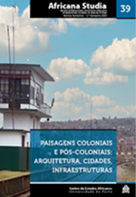‘A land of minerals’: Oil Extraction and Constructs of French Coloniality in the Algerian Sahara
Resumo
‘A land of minerals’: Oil Extraction and the Construct of French Coloniality in the Algerian Sahara In 1956 oil was discovered in the Algerian Sahara. The discovery sparked a huge infrastructural investment from the French metropole, with wells, roads and residential areas rapidly constructed across the desert. The colonial state widely promoted these developments as vast social ‘improvements’. But their tangible impacts on local communities were widely overlooked or presupposed, thus affecting the society of the late colonial era in Algeria. This paper examines how the development of the oil industry impacted residents and shaped socio-spatial practices across the Algerian Sahara between 1952 and 1962. The analysis concentrates on how colonial directives and ideologies directly and indirectly shaped the oil sector and explores the corollary implications, focusing on local social structures, urban and infrastructural landscapes and ethnic and regional identity archetypes.
As an industry with close links to the state, migratory labour and local communities, the paper posits that the oil sector provides a critical insight into both the lived realities and socio-political mechanisms of late colonial rule across the Mediterranean.
Keywords: Algerian Sahara, colonialism, oil sector, infrastructure.
Downloads
Downloads
Publicado
Como Citar
Edição
Secção
Licença
Direitos de Autor (c) 2024 Africana Studia

Este trabalho encontra-se publicado com a Creative Commons Atribuição-NãoComercial 4.0.
Os autores cedem à Revista Africana Studia o direito exclusivo de publicação dos seus textos, sob qualquer meio, incluindo a sua reprodução e venda em suporte papel ou digital, bem como a sua disponibilização em regime de livre acesso em bases de dados.
As imagens, no caso de serem originais e enviadas por via postal, serão devolvidas se assim for explicitado pelos autores.
A Africana Studia é uma revista de acesso aberto que visa promover a divulgação e o debate da investigação científica. Todos os artigos aceitos são, portanto, publicados gratuitamente para autores e editores.




